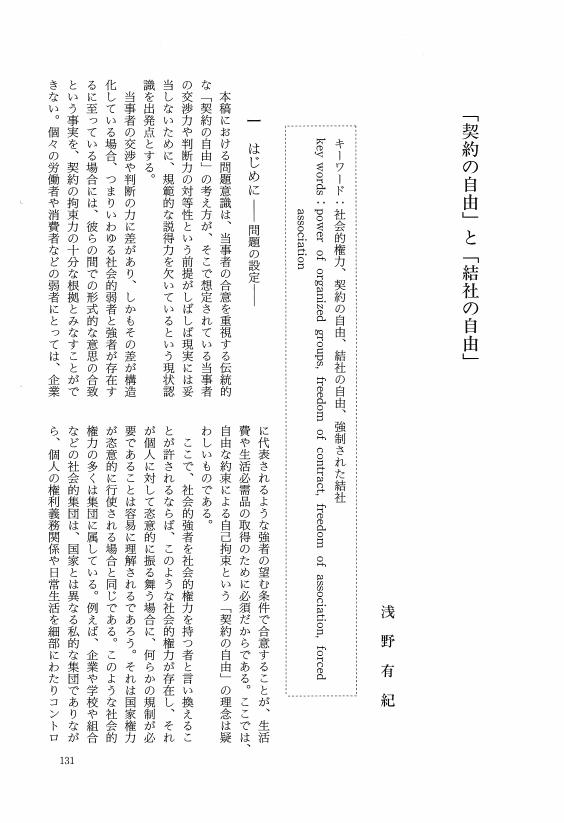2 0 0 0 OA 「契約の自由」と「結社の自由」
- 著者
- 浅野 有紀
- 出版者
- 日本法哲学会
- 雑誌
- 法哲学年報 (ISSN:03872890)
- 巻号頁・発行日
- vol.2001, pp.131-138, 2002-10-30 (Released:2008-11-17)
- 参考文献数
- 10
2 0 0 0 トランスナショナル・ローの法理論―多元的法とガバナンス
- 著者
- 浅野 有紀 横溝 大 藤谷 武史 原田 大樹 清水 真希子 松中 学 長谷川 晃 田村 哲樹 松尾 陽 加藤 紫帆
- 出版者
- 同志社大学
- 雑誌
- 基盤研究(B)
- 巻号頁・発行日
- 2016-04-01
研究2年目に当たる本年度は、トランスナショナルローを巡る法的・政治的問題についての理論研究をさらに進めると共に、組織規範動態WGと国際金融規制WGにおいて、実証研究に向けた本格的検討を開始した。先ず、理論研究については、3回の全体研究会を開催し(2017年7月、8月、及び、2018年2月)、共同研究者や国内の他の研究者による報告を基に意見交換を行い、知見を深めた。具体的に扱ったテーマは、「トランスナショナル・ローと法哲学の課題――多様な正統性と機能主義的考察」、「グローバルな土地収奪のトランスナショナル・ローの観点からの研究」、「解釈主義的法理論とトランスナショナル・ロー」、「立法過程と政治学の応用」、「批判法学から法多元主義、法多元主義から批判法学へ-無意識的な『法の帝国』化について」、「グローバル・ガバナンスと民主主義-方法論的国家主義を超えて」である。また、実証研究については、組織規範動態WGが2回の会合を(2017年9月、12月)、国際金融規制WGが1回の会合を(2018年3月)開催し、実証研究を進める際のテーマの選定や方法について検討を重ねた。その上で、各研究分担者が、3年目以降にさらに理論又は実証研究を進展させるべく、その基礎となる論稿を中間的成果として日本語・英語で執筆・公表した。具体的には、'Self-regulations and Constitutional Law in Japan as Seen From the Perspective of Legal Pluralism'、「法多元主義の下での抵触法」、「グローバル・ガバナンスと民主主義」、「グローバル化と行政法の変容」、「ソフトロー」、「コーポレートガバナンスと政治」、「グローバル資本規制」等である。
1 0 0 0 OA 八代報告への討論 ―目己決定権と人格権の観点から―
- 著者
- 浅野 有紀
- 出版者
- 日本法哲学会
- 雑誌
- 法哲学年報 (ISSN:03872890)
- 巻号頁・発行日
- vol.2008, pp.50-57, 2009 (Released:2021-12-29)
In his work. Professor Yashiro argues for the liberalization of temporary employment and easing of regulations against dismissal of employees. He suggests the deregulation of the labor market in this manner is necessary to boost the economy as well as to assure free and fair distribution of work between regular and temporary workers. This comment aims to examine his argument from the viewpoint of two significant rights: the right to self-determination and the right to personhood. If these rights warrant protection, and his proposal infringes on either of them, it may be argued that the rationale of economic utility cannot be given priority and must be adjusted so as not to devastate the social order the.se rights protect. First, beginning with the right to self-determination. Professor Yashiro stresses that freedom of contract within the labor market provide greater assurances of this right than is provided through regulatory policy, allowing various types of work beyond standard regular employment. It must be noted, however, that many people choose such part-time and irregular employment not because they prefer it. but rather because they have no alternative. Second, with respect to the right to personhood. Professor Yashiro argues to abolish the current regulations against dismissal in order to diminish the disparity between regular and temporary employees. However, this approach actually means that all employees would face the same risk of dismissal without special legal protection. The right to personhood protects individuals from such commodification and subjection to the arbitrary whims of purchasers. The right to self-determination argument is suspect because of its ambiguous nature and latent paternalism in actual practice. Instead, this comment proposes a right to personhood which prohibits excessive commodification of individuals in order to protect the idea of human dignity indispensable for social order. This means that, like free prostitution, a free labor market should not be adopted.
1 0 0 0 OA コメント「リバタリアンと交換的正義」
- 著者
- 浅野 有紀
- 出版者
- 日本法哲学会
- 雑誌
- 法哲学年報 (ISSN:03872890)
- 巻号頁・発行日
- vol.2004, pp.105-111,202, 2005-09-30 (Released:2008-11-17)
- 参考文献数
- 4
This comment addresses two critical points about libertarian legal philosophy. The first relates to the possible contradiction between the idea of property and freedom of contract, two ideas on which libertarianism is usually thought to be based. To clarify this contradiction, I refer to the argument made by Murray Rothbard. He argues that a person has a contractual duty only when his default amounts to ‘theft.’ Identification of contractual duty and theft in this way is, Rothbard insists, necessary to explain libertarianism coherently. However, considering the breaking of contractual duty as theft has to mean that rights and duties resulting from contracts should be correlative in some objective or economic sense. The correlation cannot derive from freedom of contract, but instead must stem from the protection of property and the relationship between rights and duties according to corrective justice. Accordingly, it is my opinion that libertarianism must allow for some intervention by a third party, possibly the state, in order to ensure this objective correlation. My second point addresses the close relationship between the idea of the freeianism. In this paper, I attempt to define a comprehensive vision of a libertarian legal system and show the significance of libertarian legal theory. I start by illustrating three fundamental backgrounds of libertarian legal theory. The first is an awareness that useful knowledge disperses widely across a society, as emphasized by F.A. Hayek. The second is a libertarian view of human nature. Libertarianism does not presuppose a stereo-type, but rather accepts multiple types of human nature. According to the third background, which pertains to methodology, there exist two types of approaches a natural rights-based approach and a consequentialistic one. I then explain the features of libertarian legal theory. I consider private law-based legal principles, restitution as alternative to punishment, and emphasis on the rule of law to be the three main characteristics of this theory. Finally, I consider the implications of libertarian legal theory for today. The features of this theory appear to be similar to those of classical modern law. However, I believe that it should not be understood merely as a regression to classical modern law. Libertarian legal theory can offer a solution to the issue of legalization (Verrechtlichung), which is one of the serious problems faced by welfare states. In other words, it can be considered a legal theory for a “post-legalized society.” Furthermore, since the patterns of social ordering and conflict resolution become diverse, there exists a requirement for various methods of legal ordering other than those initiated by the government. I believe that libertarian legal theory has the potential to be used as a legal theory for non-government-initiated legal ordering.
